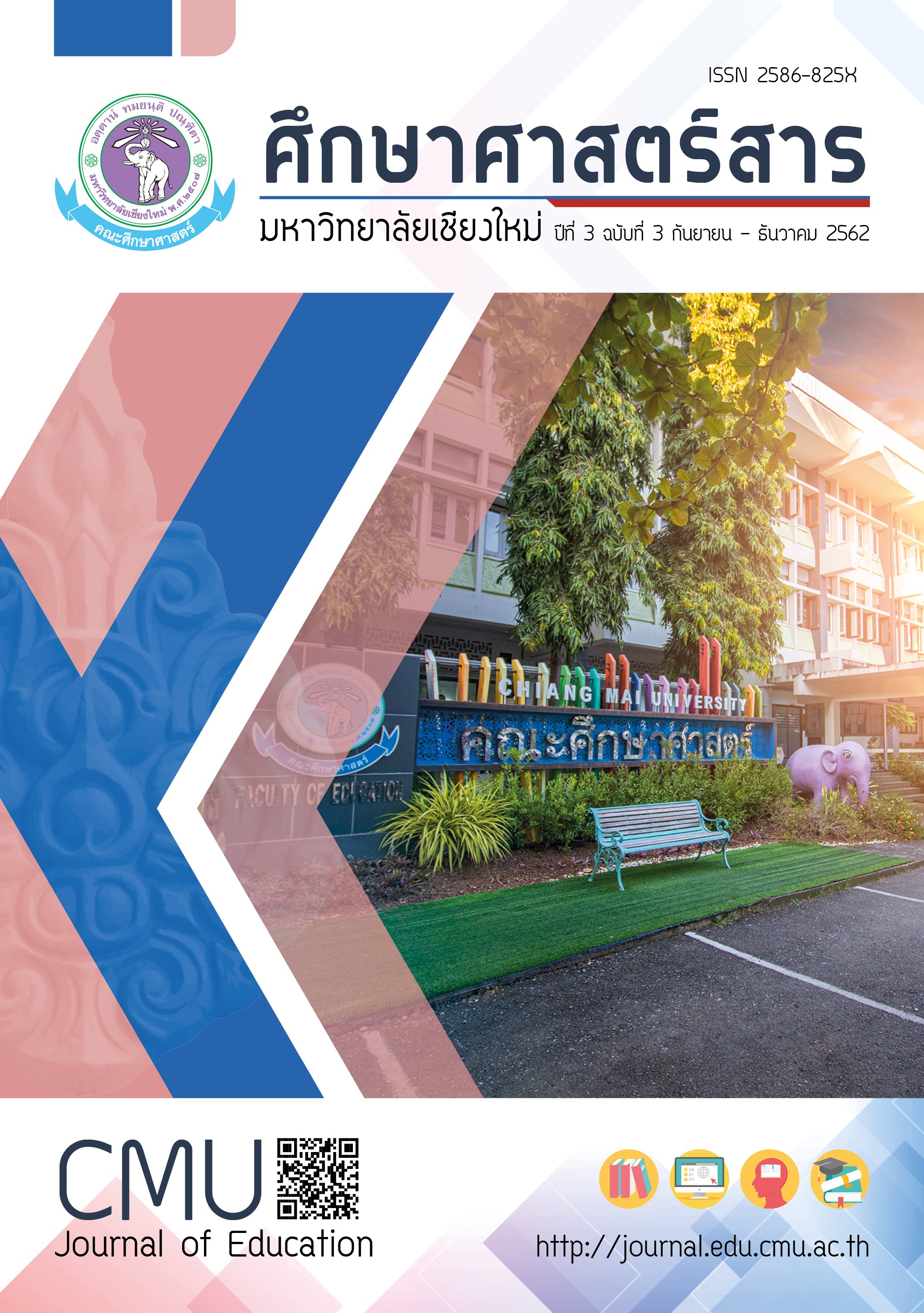การศึกษาผลการจัดการเรียนรู้โดยใช้เกมเป็นฐานต่อความเข้าใจทางวิทยาศาสตร์ วิชาชีววิทยา เรื่อง การถ่ายทอดลักษณะทางพันธุกรรม ของนักเรียนชั้นมัธยมศึกษาปีที่ 4
Main Article Content
บทคัดย่อ
การวิจัยครั้งนี้มีวัตถุประสงค์เพื่อสร้างกิจกรรมการเรียนรู้ตามแนวคิดการจัดการเรียนรู้โดยใช้เกมเป็นฐานที่สามารถพัฒนาความเข้าใจทางวิทยาศาสตร์ ในวิชาชีววิทยา เรื่อง การถ่ายทอดลักษณะทางพันธุกรรม แก่นักเรียนชั้นมัธยมศึกษาปีที่ 4 จำนวน 39 คน ปีการศึกษา 2561 โดยใช้แบบฝึกทักษะ แบบสังเกตพฤติกรรมความเข้าใจ และแบบทดสอบความเข้าใจทางวิทยาศาสตร์ วิเคราะห์ข้อมูลโดยใช้สถิติพื้นฐานและตรวจสอบข้อมูลแบบสามเส้า พบว่า ทั้ง 7 กิจกรรมการเรียนรู้โดยใช้เกมเป็นฐานที่ผู้วิจัยสร้างขึ้นมีความเหมาะสมอย่างมากต่อการนำไปจัดการเรียนรู้ (4.80 – 5.00) และสามารถพัฒนาความเข้าใจทางวิทยาศาสตร์ของนักเรียนกลุ่มเป้าหมายได้ โดยยืนยันได้จากผลการประเมินแบบฝึกทักษะ แบบสังเกตพฤติกรรมความเข้าใจที่มีค่าร้อยละเฉลี่ยสูงขึ้นอย่างต่อเนื่อง รวมถึงคะแนนเฉลี่ยของแบบทดสอบความเข้าใจทางวิทยาศาสตร์ก่อนเรียนและหลังเรียนมีความแตกต่างกันในระดับมาก (Effect size = 3.24)
Article Details
หากผู้เสนอบทความมีความจำเป็นเร่งด่วนในการตีพิมพ์โปรดส่งลงตีพิมพ์ในวารสารฉบับอื่นแทน โดยกองบรรณาธิการจะไม่รับบทความหากผู้เสนอบทความไม่ปฏิบัติตามเงื่อนไขและขั้นตอนที่กำหนดอย่างเคร่งครัด ข้อมูลของเนื้อหาในบทความถือเป็นลิขสิทธิ์ของ Journal of Inclusive and Innovative Education คณะศึกษาศาสตร์ มหาวิทยาลัยเชียงใหม่
เอกสารอ้างอิง
2. ทิศนา แขมมณี. (2560). ศาสตร์การสอน องค์ความรู้เพื่อการจัดกระบวนการเรียนรู้ที่มีประสิทธิภาพ. กรุงเทพมหานคร: สำนักพิมพ์แห่งจุฬาลงกรณ์มหาวิทยาลัย.
3. สุวิมล ว่องวาณิช. (2550). การวิจัยปฏิบัติการในชั้นเรียน. กรุงเทพมหานคร: ศูนย์หนังสือ-จุฬาลงกรณ์มหาวิทยาลัย.
4. Al-Tarawneh, M. H., (2016). The effectiveness of educational games on scientific concepts acquisition in first grade students in science. Journal of Education and Practice, 7(3), 31-37.
5. Allen G. D. (2007). Misconceptions in Mathematics. Texas: Department of Mathematics, Texas A&M University. Writing teaching document.
6. Anderson, L. W., Krathwohl, D. R. (2001). A taxonomy for learning, teaching and assessing: A revision of Bloom’s taxonomy of educational objectives. New York: Addison Wesley Longman.
7. Andrews, T. M., Price R. M., Mead L.S., McElhinny, T. L., Thanukos, A., Perez, K. E., Herreid, C. F., Terry, D. R., & Lemons, P. P. (2012). Biology undergraduates’ misconceptions about genetic drift. CBE-Life Sciences Education, 11, 248-259.
8. Bahar, M. (2003). Misconceptions in biology education and conceptual change strategies. Kuram ve Uygulamada Eğitim Bilimleri, 3, 55-64.
9. Cameron, B., & Dwyer, F. (2005). The effect of online gaming, cognition and feedback type in facilitating delayed achievement of different learning objectives. Journal of Interactive Learning Research, 16(3), 243–258.
10. Carin, A. A., & Bass, J. E. (1997). Teaching science as inquiry (9thEd.). New Jersey: Merrill Prentice Hall.
11. Ellington, H. (1987). How game and simulations can be used in tertiary education. Teaching and Learning in Higher Education. 3-16.
12. Eyler, J., & Giles, D. E. (1999). Where’s the learning in service-learning? San Francisco: Jossey-Bass.
13. Galvin, E., Simmie, G. M., & O’Grady, A. (2015). Identification of misconceptions in the teaching of biology: A pedagogical cycle of recognition, reduction and removal. Higher Education of Social Science, 8(2), 1-8.
14. Hamari, J., Shernoff, D. J., Rowe, E., Coller, B., Asbell-Clarke, J., & Edwards, T. (2016). Computers in Human Behavior, 54, 170-179.
15. Khoo, A., & Gentile, D, A. (2007). Problem-based learning in the world of digital games. In O.-S. Tan (Ed.), Problem-based learning in eLearning breakthroughs (pp. 97-129). Singapore.
16. Liu, E. Z. F., & Chen, P. K. (2013). The effect of game-based learning on students’ learning performance in science learning – a case of “conveyance go”. Procedia – Social and Behavioral Sciences, 103, 1044-1051.
17. McGonigal, J. (2001). Reality Is Broken: Why games make us better and how they can change the world. New York: Penguin Press.
18. Meyers, C., & Jones, T. B. (1993). Promoting active learning: strategies for the college classroom. San Francisco: Jossey-Bass.
19. Mustami, K. (2016). Identifying the misconceptions in students’ biology department on genetics concept with CRI method. The Social Sciences, 11(13), 3348 – 3351.
20. Nadelson, L. S. (2009). Preservice teacher understanding and vision of how to teach biological evolution. Evolution: Education and Outreach, 2, 490 – 504.
21. Qian, M., & Clark, K. (2016). Game-based learning and 21st century skills: A review of recent research. Computers in Human Behavior. 63, 50-58.
22. Smith, J. P., diSessa, A. A., & Roschelle, J. (1993). Misconceptions reconceived: A constructivist analysis of knowledge in transition. The Journal of the Learning Sciences, 3(2), 115 – 163.
23. Tekkaya, C. (2002). Misconceptions as barrier to understanding biology. Journal of Education, 23, 259 – 266.
24. Trilling, B., & Fadel, C. (2009). 21st century skills: learning for life in our times. California: John Wiley & Sons.


